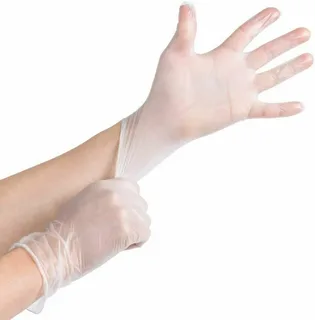Vinyl-gloves have become a staple in various industries, offering an affordable and effective way to protect hands from contaminants and hazards. Whether working in food service, healthcare, or cleaning, these versatile gloves are designed to keep your hands safe while allowing for agility and comfort. With their wide range of uses and features, Vinyl-gloves are the unsung heroes of hand protection.
But what exactly sets Vinyl-gloves apart? Why should they be your go-to choice for safeguarding your skin? Join us as we dive into Vinyl gloves—exploring their types, benefits, proper usage tips, and more. This comprehensive guide will equip you with all the information you need to make informed decisions about this essential protective gear. Let’s get started!
Types of Vinyl-gloves
Vinyl-gloves come in various types, each designed for specific tasks. Disposable Vinyl-gloves made from polyvinyl chloride (PVC) are the most common. These are ideal for single-use scenarios where quick changes are necessary.
Then, there are powdered and powder-free options. Powdered gloves have a light coating of cornstarch that makes them easier to put on and take off. However, some users prefer powder-free varieties to minimize the risk of contamination or allergic reactions.
Different thickness levels are also available. Thinner gloves offer greater dexterity, while thicker ones provide more durability against tears and punctures.
For those seeking added comfort, a range of textured surfaces is also available. These enhance grip, making them suitable for wet or oily conditions.
Each type serves its purpose well; understanding these differences helps you choose the right glove for your needs.
Uses Of Vinyl Powder Free Gloves
Vinyl powder free gloves are versatile and widely used across various industries. Their affordability makes them popular for tasks requiring protection without breaking the bank.
- In healthcare, they safeguard against contamination during patient examinations and procedures. Staff can easily switch out pairs between patients to maintain hygiene standards.
- Vinyl-gloves also benefit the food industry significantly. They prevent cross-contamination while handling ingredients or serving dishes, ensuring safety in food preparation.
- Housekeepers and janitors also rely on these gloves when cleaning with harsh chemicals or managing waste. The protective barrier helps shield the skin from irritants and harmful substances.
Additionally, Vinyl-gloves are useful in beauty salons for services like hair dyeing or manicures, protecting both clients and professionals. With such varied applications, it’s clear why many choose vinyl for everyday hand protection.
Features And Benefits Of Disposable Vinyl Gloves
Vinyl-gloves are increasingly popular due to their versatile features. Made from polyvinyl chloride (PVC), they offer a lightweight alternative to other glove types. This material provides excellent flexibility, making them easy to slip on and off.
One standout benefit is their cost-effectiveness. Disposable Vinyl gloves are generally more affordable than latex or nitrile options, making them accessible to various industries. Their budget-friendly nature keeps quality intact.
These gloves also protect against contaminants, oils, and certain chemicals. They are useful in environments like food service and janitorial work, where sanitation is key.
Additionally, Vinyl-gloves come in powdered and powder-free varieties. The former allows for easier donning, while the latter minimizes allergic reactions—a thoughtful feature catering to sensitive users.
Another advantage is durability; although not as robust as nitrile or latex, they effectively resist tearing during light tasks.
How to Choose the Right Size and Fit?
Selecting the right size and fit for Vinyl-gloves is crucial for comfort and effectiveness. Start by measuring your hand. Use a tape measure around the widest part of your palm to determine the circumference.
- Most glove manufacturers provide sizing charts. Compare your measurements with these charts to find your ideal size, usually small, medium, large, or extra-large.
- Consider finger length, too. A well-fitting glove should cover your entire hand without excess material at the fingertips.
- Try on different brands. Variations in design can affect how they conform to your hand shape.
Remember that snug gloves offer better dexterity but shouldn’t be so tight that they’re uncomfortable. When you find a pair that feels just right, you’ll enjoy greater mobility and protection in any task you tackle.
Proper Usage and Disposal of Vinyl-gloves
Proper usage of Vinyl-gloves is crucial for maintaining hygiene and safety. Always ensure your hands are clean before putting on a pair. This prevents contaminants from being trapped inside the gloves.
When wearing gloves, avoid touching your face or other surfaces unnecessarily. This limits cross-contamination risks. If you notice any tears or punctures, replace them immediately to maintain protection.
Disposal is just as important as usage. Remove the gloves carefully by peeling them off inside out, avoiding contact with the outer surface that may be contaminated. Dispose of them in a designated waste bin.
Never reuse Vinyl-gloves; they are designed for single use only. Proper disposal ensures that pathogens do not spread and keeps our environment cleaner. Following these guidelines enhances safety for everyone involved, whether in food prep, cleaning, or healthcare settings.
Alternatives to Vinyl-gloves
While Vinyl-gloves are popular, several alternatives may suit different needs. Nitrile gloves are a top choice for puncture resistance and chemical protection. They provide a snug fit and superior durability.
Latex gloves offer excellent flexibility and tactile sensitivity, making them ideal for medical professionals. However, some individuals may have latex allergies.
For eco-conscious users, biodegradable options such as plant-based or compostable gloves can help reduce plastic waste without sacrificing performance.
Neoprene is another alternative that provides good barrier protection against chemicals while being latex-free.
Each of these options offers unique benefits. Exploring various glove types ensures you find the best match for your tasks and preferences.
Vinyl-gloves: The Go-To Solution for Affordable Hand Protection
Vinyl-gloves have become a favourite choice for those seeking budget-friendly hand protection. Made from synthetic polyvinyl chloride (PVC), they offer a reliable barrier without breaking the bank.
- Their affordability makes them accessible to various industries, from food service to janitorial work. Businesses can easily stock up on Vinyl-gloves without worrying about steep costs, ensuring employees remain protected during tasks.
- Comfort is another essential aspect. Vinyl-gloves are designed to fit snugly while still allowing ample dexterity. This means you can perform intricate tasks without compromising safety.
- Vinyl-gloves also come in different sizes and styles, catering to diverse needs across sectors. Whether preparing food or cleaning surfaces, they are an effective shield against contaminants and chemicals.
For anyone looking for economical hand protection, Vinyl-gloves are a practical solution that doesn’t sacrifice quality or functionality.
How Vinyl-gloves Enhance Safety in Food Prep, Cleaning, and More?
Vinyl-gloves play a crucial role in maintaining hygiene across various settings. In food preparation, they create a barrier against contaminants, helping prevent cross-contamination between raw and cooked foods. Cleaning tasks also benefit from the use of Vinyl-gloves. They protect hands from harsh chemicals and harmful bacteria often present on surfaces. Wearing gloves ensures these substances do not contact the skin directly, reducing potential irritation or allergic reactions.
In healthcare environments, Vinyl-gloves are essential for safeguarding patients and caregivers. They minimize the risk of transferring pathogens during examinations or other medical procedures. Beyond these applications, Vinyl-gloves offer convenience and comfort. Their lightweight nature allows for dexterity while performing intricate tasks without losing grip or control. Whether cooking, cleaning, or caring for others, they enhance safety.
Affordable and Reliable Protection for Every Industry
Vinyl-gloves have carved a niche in various industries, proving affordable and reliable. Their cost-effectiveness makes them an appealing option for businesses looking to maintain hygiene without breaking the bank. From healthcare facilities to food service environments, these gloves offer essential protection against contaminants. They create a barrier that safeguards both workers and clients alike.
Many industries favour Vinyl-gloves due to their ease of use. The gloves are lightweight and comfortable, allowing extended wear during tasks without causing fatigue or discomfort. Moreover, they come in different sizes and styles to cater to diverse needs. Whether you’re preparing food or conducting medical examinations, there’s a suitable pair available.
Another significant advantage is their versatility. Vinyl-gloves can handle various applications while providing adequate protection from spills, chemicals, and biological hazards.
Conclusion
Whether you’re in food service, healthcare, or cleaning, Vinyl gloves provide reliable protection without sacrificing dexterity. Their ease of use makes them popular among professionals and everyday users alike. Choosing the right glove is crucial for ensuring safety and comfort. With a range of sizes available, everyone can find a fit that works for them. As awareness around health and safety continues to rise, Vinyl-gloves will remain a go-to option. The balance between cost-effectiveness and functionality sets them apart in hand protection. Exploring options within this category can lead to better choices tailored to specific needs across numerous sectors.
FAQS
Many questions arise about vinyl gloves. Here are three frequently asked questions that can help clarify some common concerns.
What are Vinyl gloves made of?
Vinyl gloves are made from polyvinyl chloride (PVC), a synthetic plastic polymer. This lightweight material offers flexibility, making it comfortable for extended wear while providing adequate protection against minor hazards.
Are Vinyl-gloves suitable for medical use?
While Vinyl-gloves are commonly used in various settings, they may not provide the same barrier protection as nitrile or latex gloves. They can be used in low-risk medical situations but should not replace more protective options when dealing with high-risk environments or hazardous materials.
How do I properly dispose of Vinyl gloves?
Vinyl-gloves must be disposed of responsibly after use. They should be removed carefully to avoid contamination and discarded in regular trash unless used with hazardous substances. Always check local regulations regarding disposal methods for single-use personal protective equipment (PPE).
These FAQs address some key points about vinyl glove usage, ensuring you’re well-informed on their applications and care.
| Related Business Listings |
| Contact Directory |
| Local Business Profiles |




